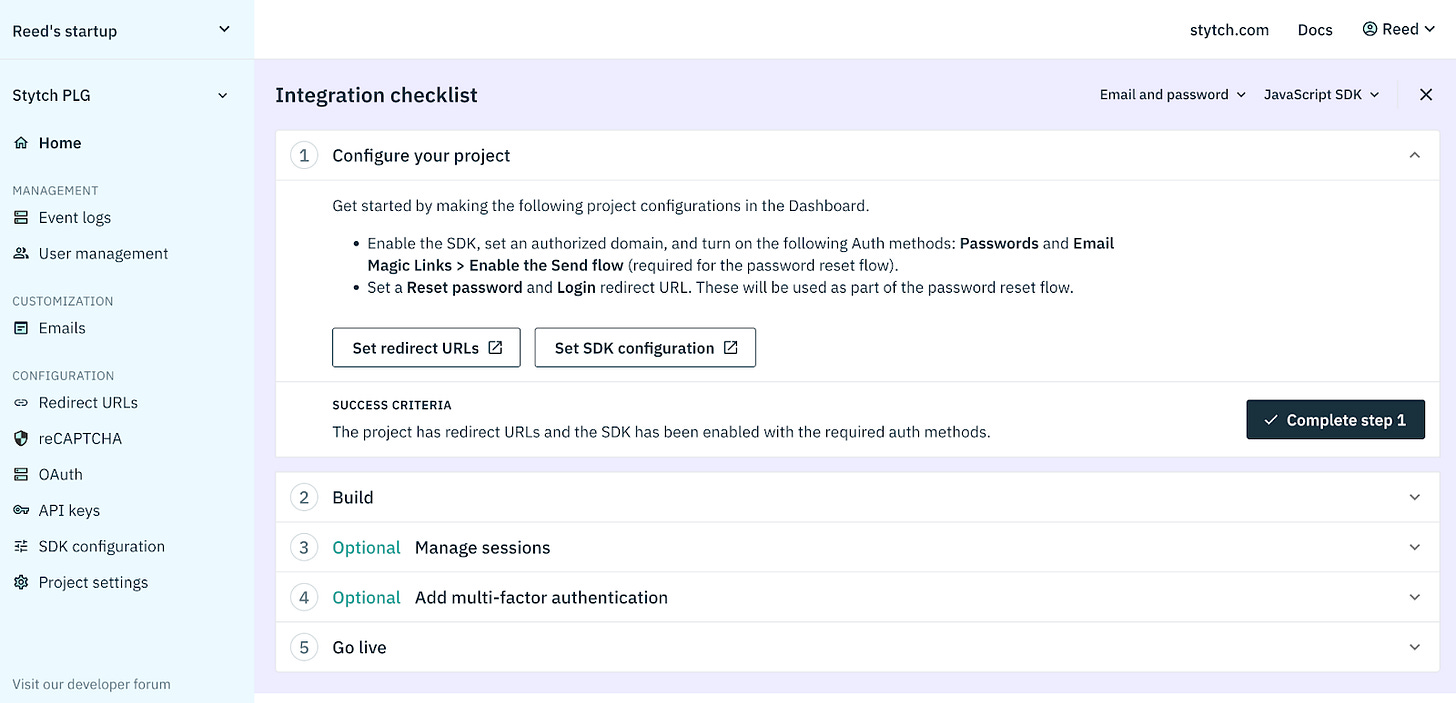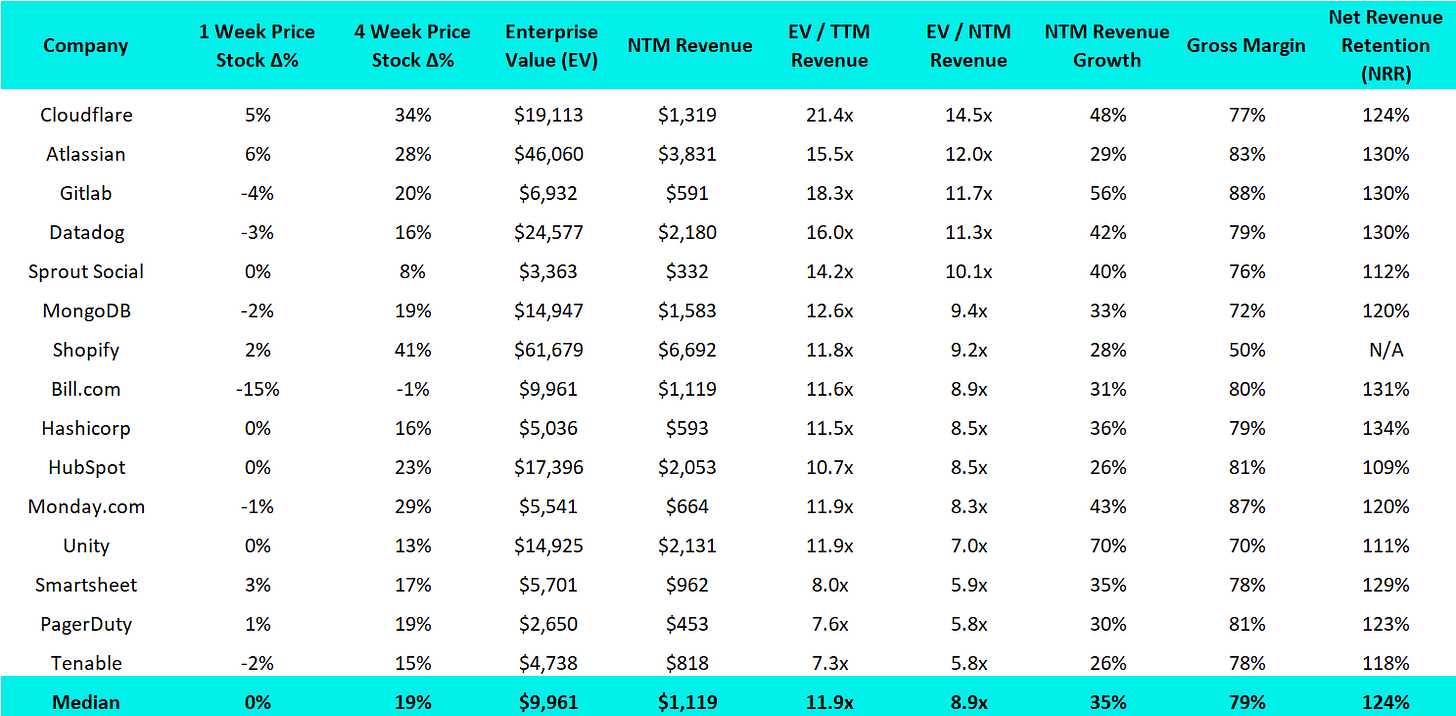NPLG 2.9.23: Developer-First PLG (Stytch)
The best PLG founders, startups, strategies, metrics and community. Every week.
Current subscribers: 5,946, +94 since last week (+1.6%)
Share the PLG love: please forward to colleagues and friends! 🙏
NPLG Startup of the Week: Stytch
Anyone with an internet connection has experienced the shortcomings of dated or clunky signup and login flows. As it turns out, building or implementing auth can be just as frustrating to build as it is to use.
To solve this, Stytch was born –– it’s a developer-first API startup that is re-imagining how we access the web. With more flexible, customizable, and future-forward authentication solutions, Stytch helps developers reduce time-to-value and build intuitive, seamless user experiences. It’s no wonder they were named the #1 Auth0 alternative in just two years after their founding. In this edition of Notorious PLG, Stytch CEO and co-founder Reed McGinley-Stempel shares their PLG strategy, and how he and co-founder Julianna Lamb are working to re-center the developer experience and eliminate developer headache in the world of identity and access management.
Why PLG For Stytch
Stytch exists to remove friction from the internet, starting with authentication. Lamb and McGinley-Stempel realized that it doesn’t matter how secure your product is if neither developers nor users want to adopt it. Ultimately, both users and developers want the same thing: take care of authentication quickly and easily so they can get to the stuff that matters to them. For developers in particular, they want visibility and control.
But a lot of auth solutions today are designed as black boxes: developers have little to no visibility into the back end when something goes wrong, and little ability to customize the auth experience for their users. It often feels like you're coding with oven mitts when using the incumbents. Stytch calls this the “iceberg of auth”– what seems like a simple, non-differentiated feature becomes footgun-filled and resource-intensive. Time developers could and should devote to improving their core product is spent either configuring a black box 3rd party solution or cobbling something together in-house. Stytch was launched to give developers what they want: custom integration that they can get up and running in minutes, not months.
Because they’re all about empowering developers, PLG is critical to drive virality and adoption at Stytch – developers need to experience the product firsthand, and that starts with their own account creation process. In other words, the Stytch demo begins the moment a developer lands on the site and creates an account – developers use Stytch’s authentication SDK to sign up for an account, providing an early glimpse of the end products developers can build with Stytch. From the get-go, Stytch makes sure to create an intuitive and flexible developer experience so that experimenting with the product and integrating with it become one and the same.
How Stytch Does PLG
Here are Stytch’s PLG strategies and specific examples of how we implement each strategy:
1) Use the signup flow as the demo. We're in a unique position to be able to demo our product when you sign up for a Stytch account. Therefore, we use our homepage + sign-up flows as a key way to show what's possible with Stytch's product, and to put our key differentiators front and center. When you land on the Stytch homepage, you immediately see two things right away that aren't possible with our biggest competitor, Auth0:
i) You see an embedded sign-up modal customized to our site. In comparison, Auth0’s hosted solution requires a URL redirect, creating a poor experience for users and developers while also hurting conversion. Auth0’s inflexibility is one of the main frustrations developers have when working with them due to limited customization and flexibility.
ii) You see Google One-Tap (aka “Sign in with Google”) –– in other words, you see that we recognize your logged in Gmail session and there is no need to re-authenticate. Authentication via a high-converting solution like Google One-Tap isn’t possible with Auth0, and we’re making that difference front and center for developers.
2) Reduce time to the first API call. At Stytch, we’re very focused on providing an exceptional developer experience. As developers ourselves, we know what developers want when considering new software – they don’t want to get on a call, they want to be able to try things on their own time and terms. That’s why we design everything we do, including our docs, guides, Slack community and developer forum, with the goal of helping developers to get in and try our products as quickly as possible.
3) Use social proof to drive confidence.
We’ve invested in building community and conversation around our product, so that Stytch is always there to guide with an expert hand, and be the auth authority, but also to enable confidence in our products. We have an active Slack community channel for all developer questions and have created a strong support reputation through quick response times. Our newly-launched Stytch Forum serves as a useful Q&A tool for developers, and also helps to provide confidence in our products (by seeing other developers using them). We link out to these communities from every error log to help developers self-serve any issues they encounter.
I would love feedback. Please hit me up on twitter @zacharydewitt or email me at zach@wing.vc. If you were forwarded this email and are interested in getting a weekly update on the best PLG companies, please join our growing community by subscribing:
PLG Tweet(s) of the Week:
Recent PLG Financings (Private Companies):
Series A:
Lavender, an AI based e-mail assistant designed to write sales emails in an enhanced way, has raised $11M. The round was led by Norwest Venture Partners, with participation from Signia Venture Partners.
Onehouse, a cloud-native managed lakehouse platform designed to merge data lake and data warehouse, has raised $25M. The round was led by Greylock Partners and Addition.
Select Star, a startup providing data discovery, lineage and governance tools to mostly enterprise organizations, has raised $15M at a $65M valuation. The round was led by Lightspeed Venture Partners, with participation from Bowery Capital, Sozo Ventures and Pebblebed.
Series B:
Lokalise, a translation and localization management system intended to help companies to translate changing content on their website, has raised $61M at a $311M valuation. The round was led by CRV, with participation from 3VC, Creandum, Dawn Capital, Chalfen Ventures, S16VC and Web Summit Ventures.
Moov, a financial platform intended to make sending, receiving, and storing money simple, has raised $45M at a $330M valuation. The round was led by Commerce Ventures, with participation from Andreessen Horowitz, Bain Capital Ventures, Visa, and Sorenson Ventures.
Triple Whale, a startup that provides Shopify store owners with a single platform that brings together all of their analytics into a single service, has raised $25M. Participants in the round include NFX and Elephant, with strategic participation from Shopify itself.
Recent PLG Performance (Public Companies):
Financial data as of previous business day market close.
Best-in-Class PLG Benchmarking:
15 Highest PLG EV / NTM Multiples:
15 Biggest PLG Stock Gainers (1 month):
Complete Notorious PLG Dataset (click to zoom):
Note: TTM = Trailing Twelve Months; NTM = Next Twelve Months. Rule of 40 = TTM Revenue Growth % + FCF Margin %. GM-Adjusted CAC Payback = Change in Quarterly Revenue / (Gross Margin % * Prior Quarter Sales & Marketing Expense) * 12. Recent IPOs will have temporary “N/A”s as Wall Street Research has to wait to initiate converge.











